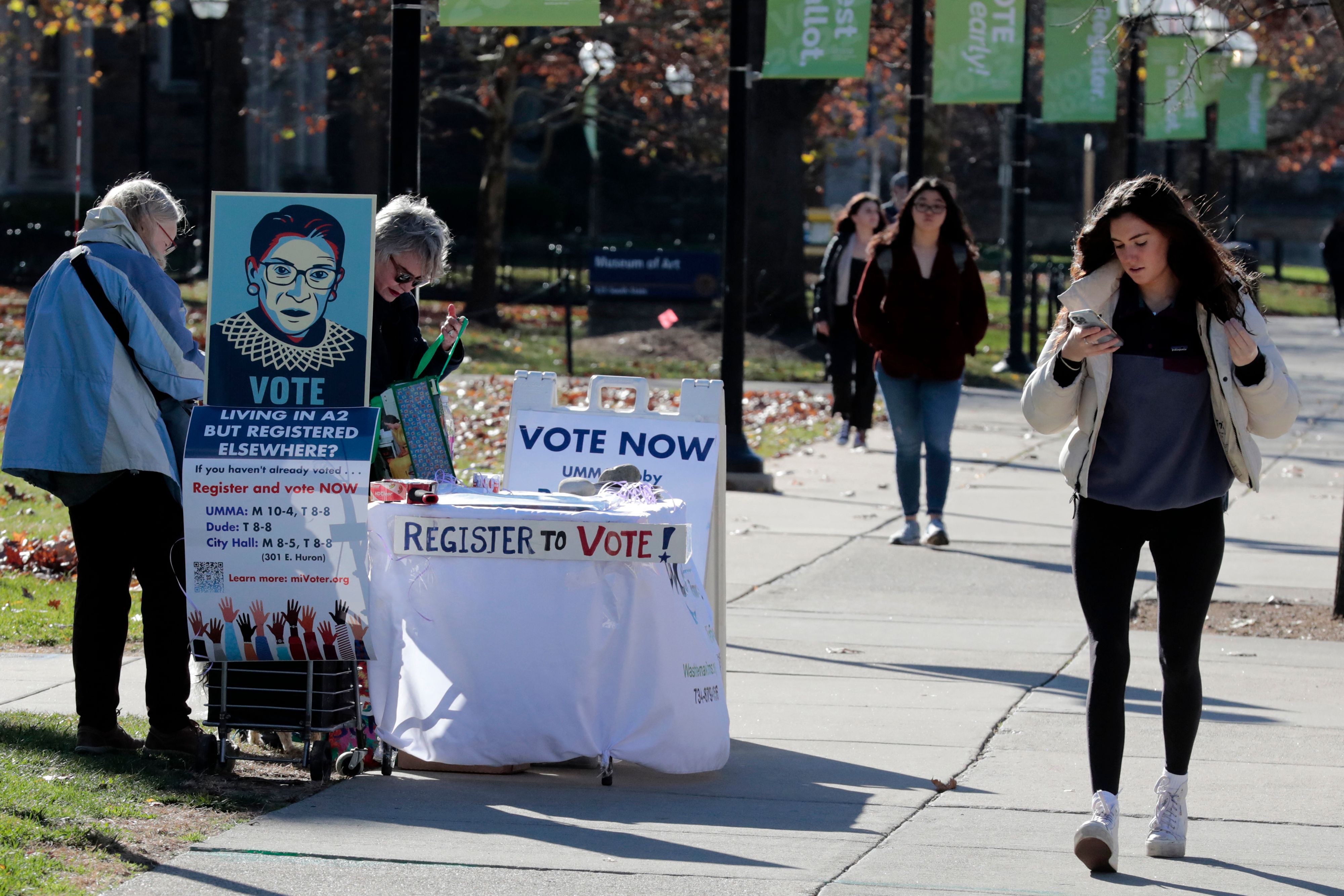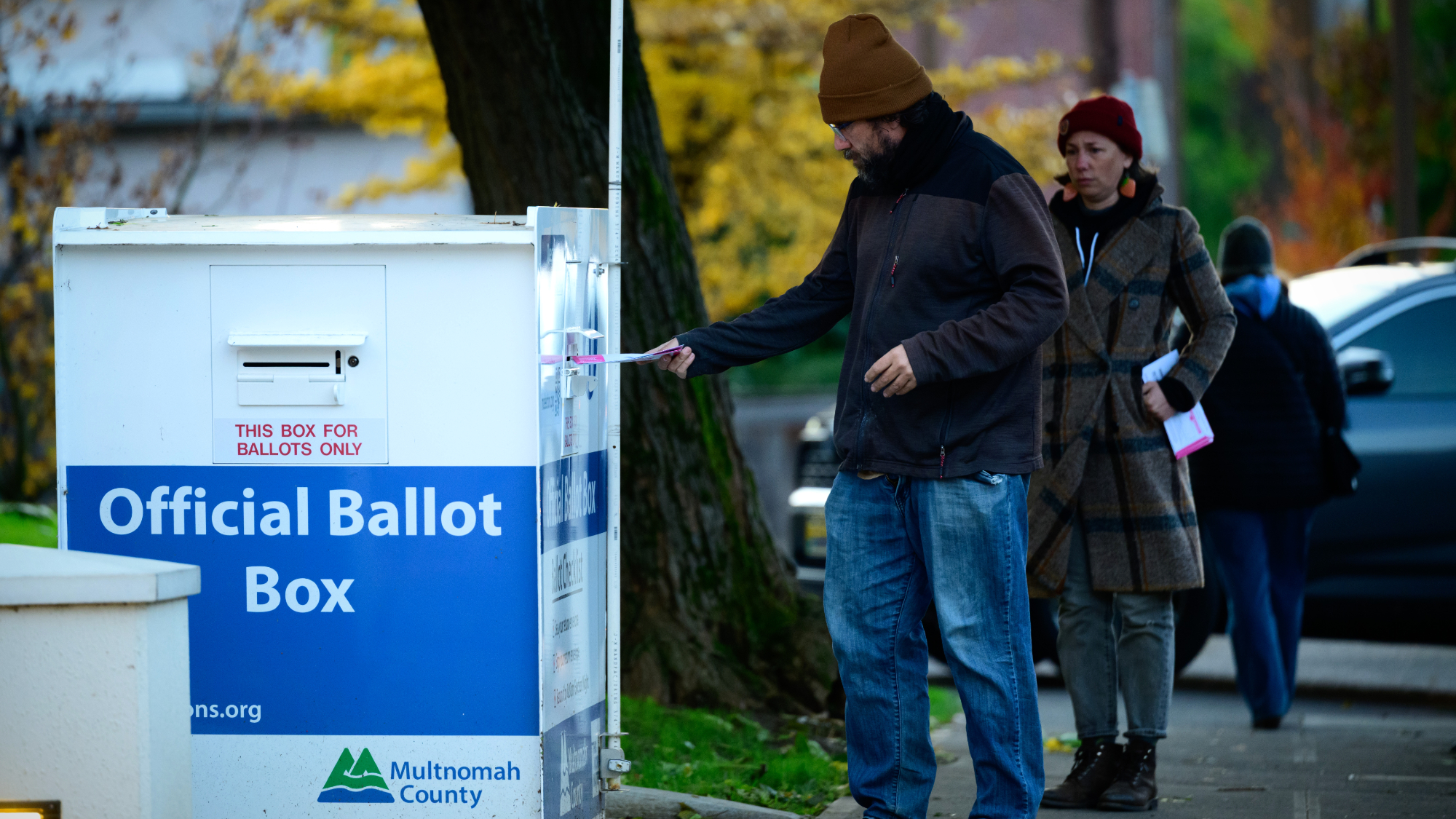The next voting rights battle could be on a campus near you
College students could soon find themselves on the front lines of a broader fight over who can vote and how


A free daily email with the biggest news stories of the day – and the best features from TheWeek.com
You are now subscribed
Your newsletter sign-up was successful
When Milwaukee County Judge Janet Protasiewicz defeated former Supreme Court Justice Dan Kelly in early April to flip Wisconsin's highest judicial body to its first liberal majority in a decade in a half, her path to victory wound conspicuously through the state's prized system of college campuses. Protasiewicz's double-digit margin was "unlike anything that's ever been seen in a spring election in terms of turnout on college campuses," campus voting access organizer Teddy Landis told Wisconsin Public Radio. Data provided to The Washington Post by Landis' "Project 72 WI" voting outreach group showed voting rates in University of Wisconsin campus precincts at levels "near November's midterms," with Democrats in particular "able to increase their vote share from the 2022 gubernatorial race."
While the much-sought-after "youth" bloc has traditionally been a fickle one to motivate into the nearest voting booth, the Wisconsin Supreme Court race showed fairly decisively that, when motivated and given the resources to act, younger voters can indeed have a decisive impact on elections. Unsurprisingly, then, that capacity for decisive impact has not gone unnoticed by Democrats hoping to lock in a key demographic, nor by Republicans worried by the bloc's broadly leftward lean. To that end, conservatives have increasingly begun looking to college campuses like those that powered Protasiewicz's victory as their next target in a broader partisan fight over voting access.
'They just have to roll out of bed'
At a recent Republican National Committee donor retreat in Nashville, Tennessee, longtime right-wing attorney and activist Cleta Mitchell had a problem.
The Week
Escape your echo chamber. Get the facts behind the news, plus analysis from multiple perspectives.

Sign up for The Week's Free Newsletters
From our morning news briefing to a weekly Good News Newsletter, get the best of The Week delivered directly to your inbox.
From our morning news briefing to a weekly Good News Newsletter, get the best of The Week delivered directly to your inbox.
"What are these college campus locations?" Mitchell, an adviser to former President Donald Trump, asked attendees during a presentation dubbed "A Level Playing Field for 2024," audio from which was obtained by The Washington Post. "What is this young people effort that they do?" she continued in a speech that, according to the Post, focused in particular on several states with large public university systems. "They basically put the polling place next to the student dorm so they just have to roll out of bed and then just go back to bed." The presentation also allegedly lashed out against states that allow students to pre-register to vote ahead of their 18th birthday.
After the Wisconsin State Supreme Court flipped, radio host Dan O'Donnell wrote a lengthy post-mortem for the conservative MacIver Institute think tank diagnosing the state GOP's condition. He noted that "Republican vote erosion might be survivable in statewide elections if it didn't coincide with an absolute explosion in Democrat turnout in Dane County," the site of the University of Wisconsin's main Madison campus. "The dramatic increase in the use of mail-in and absentee voting in the wake of the COVID-19 pandemic allowed for far greater numbers of college students to more easily cast their ballots," he continued. "With Democrats' and liberal special interest groups' huge cash haul, they were able to hire a veritable army of get-out-the-vote activists to canvass dorms and apartments scrounging up every last student they could find and bring them to early voting locations."
While the conservative focus on campus voting isn't, in and of itself, a wholly new phenomenon, the sting of the Wisconsin Supreme Court election comes amid a renewed push to limit post-secondary specific election infrastructure around the country — in Texas, a bill to close all campus polling places is currently working its way through the state legislature. In Idaho last month, Republican Gov. Brad Little signed into law a new measure that removed student IDs from the list of approved voter identification forms, prompting a lawsuit from the youth advocacy group March For Our Lives, which claimed, among other things, that "the number of 18- and 19-year-olds registered to vote in Idaho increased 81 percent between 2018 and 2022, the largest such increase nationwide by far." And in New Hampshire, Republicans this year tried — and ultimately failed — to bar out-of-state college students from voting in the state entirely.
Although the broader Republican effort to tighten restrictions on college-age voters has so far been uneven from state to state, "there is a lot more energy on this issue than we've seen in the past," Voting Rights Lab researcher Liz Avore told Bloomberg earlier this month.
A free daily email with the biggest news stories of the day – and the best features from TheWeek.com
Speaking recently with Fox News' Laura Ingraham, longtime GOP strategist and Trump administration official Kellyanne Conway framed the focus as part of a broader concern that younger voters "think differently on abortion, perhaps, or guns, or climate change" than the general Republican platform. "The left becomes a turnout machine with young people," she added, an acknowledgment that Democrats are poised to best capitalize on this progressive trend. In the wake of Protasiewicz's Supreme Court victory, former Republican Wisconsin Gov. Scott Walker was even more explicit in linking college voting with GOP losses, tweeting that "years of radical indoctrination — on campus, in school, with social media, and throughout culture" are the reason "younger voters are the issue" for conservatives, while specifically calling out Dane County and its University of Wisconsin at Madison campus as a major factor in the recent election.
'There is a subtle but real bigotry'
Democrats seem well aware of the renewed focus on college-related voting restrictions, with Democratic election attorney and voting rights activist Mark Elias telling the Post to "imagine if in every place in [Cleta Mitchell's GOP donor] presentation where she references campuses, she talked about African Americans. Or every place she says students, she instead talked about Latinos."
"There is a subtle but real bigotry that goes on when people target young voters because of their age," he added.
In some states, lawmakers have begun strengthening campus-related voting regulations. Last year, New York's Gov. Kathy Hochul (D) signed a measure mandating at least one polling place at any campus with 300 or more registered voters, legislation aimed at stopping "practices designed to suppress student voting, including situating polling in locations that are difficult to access and dividing campuses into multiple districts," according to Bard College Executive Vice President Jonathan Becker. Both California and Maryland have similar rules on the books.
New York's new law "lifted a massive barrier," Cornell University student and voting rights organizer Patrick Mehler told the Pew Charitable Trusts' Stateline. "We're setting them up to vote for the rest of their lives."
In 2012, a Tufts University study determined that campus voting suppression often comes in the form of "non-statutory" barriers — that is, ones indirectly related to a specific law or ordinance — in which "officials can facilitate voting, for instance, by placing easy-to-use voting machines in many convenient locations."
"Or," the study continued, "they can deliberately or inadvertently create obstacles to voting."
As the past several election cycles have shown, when those barriers — both statutory and otherwise — are overcome, college students can and do play a significant role in determining their own political representation on both a state and national level. The more those electoral muscles are flexed on campuses nationwide, the more both Democrats and Republicans will focus on capturing and channeling that potent political energy for themselves.
Rafi Schwartz has worked as a politics writer at The Week since 2022, where he covers elections, Congress and the White House. He was previously a contributing writer with Mic focusing largely on politics, a senior writer with Splinter News, a staff writer for Fusion's news lab, and the managing editor of Heeb Magazine, a Jewish life and culture publication. Rafi's work has appeared in Rolling Stone, GOOD and The Forward, among others.
-
 What to know before filing your own taxes for the first time
What to know before filing your own taxes for the first timethe explainer Tackle this financial milestone with confidence
-
 The biggest box office flops of the 21st century
The biggest box office flops of the 21st centuryin depth Unnecessary remakes and turgid, expensive CGI-fests highlight this list of these most notorious box-office losers
-
 The 10 most infamous abductions in modern history
The 10 most infamous abductions in modern historyin depth The taking of Savannah Guthrie’s mother, Nancy, is the latest in a long string of high-profile kidnappings
-
 How are Democrats turning DOJ lemons into partisan lemonade?
How are Democrats turning DOJ lemons into partisan lemonade?TODAY’S BIG QUESTION As the Trump administration continues to try — and fail — at indicting its political enemies, Democratic lawmakers have begun seizing the moment for themselves
-
 House votes to end Trump’s Canada tariffs
House votes to end Trump’s Canada tariffsSpeed Read Six Republicans joined with Democrats to repeal the president’s tariffs
-
 How are Democrats trying to reform ICE?
How are Democrats trying to reform ICE?Today’s Big Question Democratic leadership has put forth several demands for the agency
-
 Democrats push for ICE accountability
Democrats push for ICE accountabilityFeature U.S. citizens shot and violently detained by immigration agents testify at Capitol Hill hearing
-
 Gabbard faces questions on vote raid, secret complaint
Gabbard faces questions on vote raid, secret complaintSpeed Read This comes as Trump has pushed Republicans to ‘take over’ voting
-
 Democrats win House race, flip Texas Senate seat
Democrats win House race, flip Texas Senate seatSpeed Read Christian Menefee won the special election for an open House seat in the Houston area
-
 Judge tosses DOJ petition for Oregon voter data
Judge tosses DOJ petition for Oregon voter dataSpeed Read The decision was made following a letter sent by the DOJ to Minnesota
-
 Is Alex Pretti shooting a turning point for Trump?
Is Alex Pretti shooting a turning point for Trump?Today’s Big Question Death of nurse at the hands of Ice officers could be ‘crucial’ moment for America
